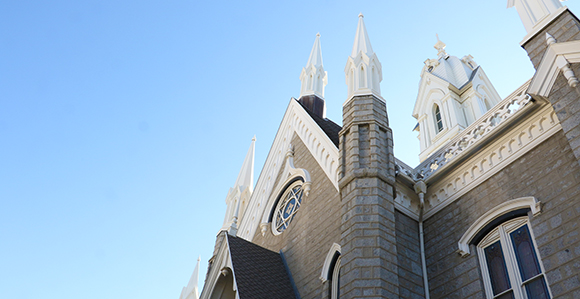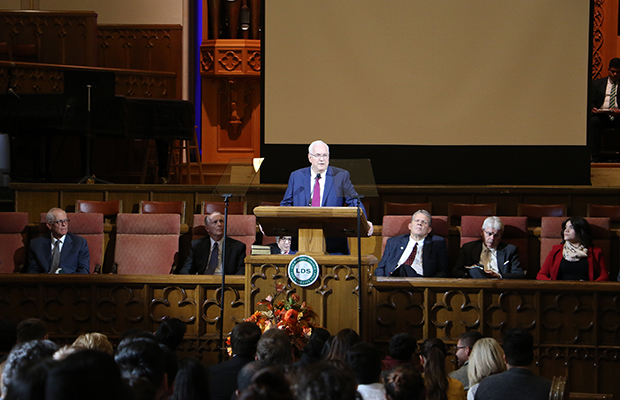General Authority Shares Two Strategies to Help You Win the “Battle for Your Soul”
Contributed By Valerie Johnson, Church News contributor

The Assembly Hall on Temple Square, photographed on November 5, 2019, before an LDS Business College devotional. Photo by Valerie Johnson.
Article Highlights
- Those who hear and keep the counsels of God will be supported against the fiery darts of the adversary and become instruments of God in blessing others’ lives.
- To receive God’s greatest blessings, we need to become submissive to God’s will.
“Our greatest test will be to determine if we, too, will partake and finish the course God lays before us. This is the underlying requirement of the first and great commandment to love God.” —Elder Robert C. Gay of the Presidency of the Seventy
Related Links
One of the most piercing questions in all of scripture was spoken by the Savior when he asked Peter, “Do you love me?” (see John 21:15).
“This question is universal to all of us,” said Elder Robert C. Gay of the Presidency of the Seventy during an LDS Business College devotional held in the Assembly Hall on Temple Square on November 5.
“I think Jesus was in part saying to Peter, ‘I know you profess my name, but do you bear my name?’”
Elder Gay spoke on becoming more valiant in bearing the name of Christ and “how to triumph against the adversary’s intensifying battle for your soul.”
He addressed, first, the importance of hearing the voice of the Lord above all other voices and, second, the need to live the principles exemplified in Christ’s submission at Gethsemane.
“Hear Him!”
When Adam and Eve were expelled from the Garden of Eden, they chose to listen only to counsel that came from the Lord or His chosen messengers. It’s clear that one of the lessons they learned in the garden was that “when you hearken to any voice except God’s, you are going to fall,” Elder Gay said.
This same guiding instruction—“Hear Him!”—opened the Restoration, when the Prophet Joseph Smith received the First Vision in the Sacred Grove. He was “immediately commanded that he was not to join any church at that time, because they were teaching as doctrines the commandments of men.”
Elder Gay warned students to be aware of the adversary’s cunning plan and to examine how they conduct their daily lives. They must always remember that “in hearkening to the voice of the commandments of men, there is no salvation,” he said.
Those who hear and keep the counsels of God will be supported against the fiery darts of the adversary and become instruments of God in blessing others’ lives.
Lessons from Gethsemane
Several years ago, one of Elder Gay’s business partners suffered from a challenging illness. Elder Gay shared how, one afternoon, he received a call from this friend, who said that President Boyd K. Packer had been to his home and given him a blessing.
“As President Packer was leaving, he said to him, ‘Don’t come back too fast from Gethsemane. Learn the lessons there.’ My friend then asked me, ‘Bob, what do you think he meant by that?’”
Elder Gay went on to explain that Gethsemane was an olive tree orchard and was a place where olives were crushed and pressed for oil.
“It was by no means coincidental that Jesus chose the Garden of Gethsemane to take upon Himself our sins,” he said. While in this garden, the Savior submitted to the “press of eternal justice that caused Him to bleed from every pore in order to redeem us from and to succor us in our imperfections that we might have eternal life.”
The first lesson of Gethsemane is that because of Christ’s Atonement, each person can be healed and saved and receive enduring, eternal joy.
“There is, however, a second overarching lesson we must deeply recognize and deeply internalize from the events of Gethsemane and Calvary,” Elder Gay said. “To receive God’s greatest blessings, we will also need to become submissive to God’s will for our lives.”
He quoted Elder Neal A. Maxwell, who said, “If we are serious about our discipleship, Jesus will eventually request each of us to do those very things which are most difficult for us to do.”
When asked what lessons he had learned from the leukemia that would eventually claim his life, Elder Maxwell said, “I have learned that not shrinking is more important than not suffering.”
Christ, when He entered Gethsemane, fell to the ground sore amazed at the task put before Him, Elder Gay said. “In our day, He said this of that moment in His mission: ‘Would that I might not drink the bitter cup and shrink—Nevertheless, glory be to the Father, and I partook and finished my preparations unto the children of men’ (Doctrine and Covenants 19:18-19).
“Submission, repentance, and sacrifice is the message to us from the garden,” Elder Gay continued. “Our greatest test will be to determine if we, too, will partake and finish the course God lays before us. This is the underlying requirement of the first and great commandment to love God.”
A profound part of submitting to God’s will is the requirement to love and serve others.
In the gospel of Jesus Christ, it doesn’t matter what a person’s race, nationality, social class, political bias, or state of life is, Elder Gay said. “We are to simply love one another with the pure love of Jesus Christ our Savior.”
He shared how during his freshman year of college, Elder Gay invited a friend of his to visit him at school. He wanted her to experience the Church and share how BYU had changed his life. During her visit, this friend, Heidi, had dinner with six other women from the BYU women’s dorm.
One of these women asked another about a new minority on campus, he said. “Another responded, ‘How many do we have on campus now?’ Then another said, ‘We better not say anything more, because Heidi is from UCLA and they have lots there.’
“That such a dialogue took place on a Church-owned campus is deeply troubling,” he said. “Everything I had been teaching my friend about our religion was undone in that dinner conversation. Our conversations and actions must transcend those of the world.”
Now, more than ever before, the adversary is attacking the Savior’s teachings and mission and anyone who follows Him. Many are falling or being silenced. Each person must decide if he or she “will take upon yourself the name of Jesus Christ or not,” Elder Gay said.
While on the journey on the covenant path, “you will need to bear His name powerfully,” Elder Gay said. Though they will be attacked and their hearts will feel dispirited at times, he promised that as each of the audience members hears His voice and submits to His will, God will give them success.
In closing, Elder Gay told the students to ask themselves, “Is there anything in my life that is worth more than all the blessings that the Father has?” He also encouraged them to ask themselves the same question the Savior asked Peter: “Do you love me?”

Students enter the Assembly Hall for an LDS Business College devotional on November 5, 2019. Photo by Valerie Johnson.

Students enter the Assembly Hall for an LDS Business College devotional on November 5, 2019. Photo by Valerie Johnson.

A combined choir of the BC Voices performs during an LDS Business College devotional held in the Assembly Hall on Temple Square on November 5, 2019. Photo by Valerie Johnson.

A combined choir of the BC Voices performs during an LDS Business College devotional held in the Assembly Hall on Temple Square on November 5, 2019. Photo by Valerie Johnson.

Elder Robert C. Gay of the Presidency of the Seventy speaks during an LDS Business College devotional in the Assembly Hall on Temple Square on November 5, 2019. Photo by Valerie Johnson.
